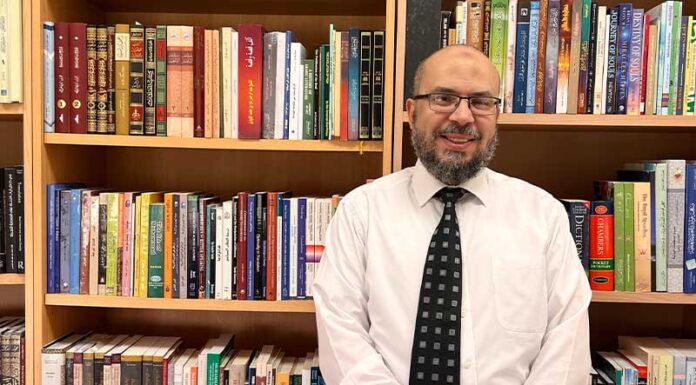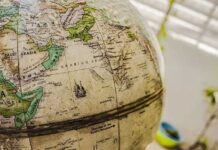By Hoor Ibrahim
“Encountering individuals from Faifaa Mountain and observing their communication in a somewhat unusual language, despite being Arabs themselves, piqued my curiosity,” says Professor Ahmed Ali, Head of Arabic and Translation Studies at the American University of Sharjah.
Professor Ali has a rich background in linguistics and translation. He started with a bachelor’s in English language and a master’s in simultaneous interpreting and written translation from the Faculty of Al-Alsun at Ain Shams University. Dr. Ali also earned a doctorate in comparative translation of the Holy Qur’an, which led him to study Arabic linguistics, rhetorical studies and Islamic studies deeply. His love for languages even took him into the world of Egyptology, where he learned about the language of Ancient Egypt.
“Witnessing the power of language to connect people, preserve heritage and shape identities deeply resonated with me.”
Dr. Ali’s passion for languages guided him to a teaching career, where he worked with students from all over the world, including at King Khalid University in Saudi Arabia. This experience helped him see how language connects people and cultures.
“Engaging with diverse linguistic communities heightened my appreciation for the necessity of preserving and honoring linguistic diversity.”
Professor Ali’s journey into the world of the Faifaa dialect is a story of curiosity, fortuity and academic pursuit. The uniqueness of the region and its language sparked his interest. Despite being Arab, the inhabitants of Faifaa Mountain communicated in a dialect that stood out to him. This was a language area largely unexplored, with less information available, which naturally aroused his curiosity.
While working in southern Arabia, Dr. Ali met a colleague who was originally from the Faifaa Mountain area. This colleague shared that his father used to write poetry in their local dialect. What caught Dr. Ali’s attention was how this colleague referred to their dialect as a “cursed language.” Such a description, likening the language to something forbidden or of another realm, intrigued Dr. Ali further.
“He made it sound like the language of the Devil,” says Dr. Ali, a phrase that only deepened his fascination.
His accidental discovery of the Faifaa language happened while he was a professor at KKU. The university’s location in Abha, near the Asir region, was close to the Faifaa Mountain. This proximity allowed him to encounter the linguistic and cultural details of the area firsthand.
Dr. Ali taught students from various backgrounds at the university, including those from the Faifaa region. Interacting with these students, he grew more interested in their ancestral language. His curiosity, coupled with a genuine desire to understand the linguistic complexities of the region, pushed him to delve deeper into the Faifaa dialect.
Although initial plans to collaborate on research with a South African colleague fell through, Dr. Ali’s interest in the Faifaa language only intensified. He decided to undertake the study of this dialect more seriously and academically, especially after moving to AUS.
Dr. Ali’s exploration into the Faifaa dialect underscores the importance of linguistic diversity and cultural heritage preservation. His journey illustrates the vital role linguists play in documenting and preserving the world’s endangered languages.
“Understanding the language of Faifaa inhabitants can foster greater appreciation and respect for their heritage,” he says.
Professor Ali’s research into the Faifaa dialect reveals a world where language intertwines with culture in complex ways. Despite the scarcity of academic studies on Faifi, his dedication shed a light on its rich linguistic and cultural landscape.
Dr. Ali adds that the lack of formal research on Faifi poses a significant challenge. There are few scholarly articles or books that delve into its phonology, grammar or sociolinguistic nuances. This absence of documented information makes understanding Faifi a daunting task for any linguist.
Professor Ali’s own journeys to Faifaa have been instrumental in his research. Accompanied by a local friend who served as both host and guide, he gained invaluable insights.
“The experience was of phenomenal importance to my research work in this area,” says Dr. Ali, highlighting the irreplaceable value of firsthand information and the personal connections he formed.
The professor believe that preserving endangered languages like Faifi is crucial for maintaining our cultural heritage. His research aims to spotlight these languages, hoping to start projects that bring them back to life.
Dr. Ali points out the struggle between keeping the Faifaa dialect alive and the push towards modern languages like Standard Arabic. Despite these challenges, he remains optimistic about raising awareness for linguistic diversity.
As generations change, Dr. Ali worries the Faifaa dialect might only survive in studies, not spoken by its people. He highlights how the younger Faifaa community is moving away from their ancestral dialect.
“Young faifis no longer use their forefathers’ language, as they communicate in Arabic of today instead,” says Dr. Ali.
Through his dedication and love for languages, Dr. Ali’s efforts continue to bridge cultural gaps and preserve linguistic heritage, leaving a lasting impact on the field of linguistics and beyond.


















